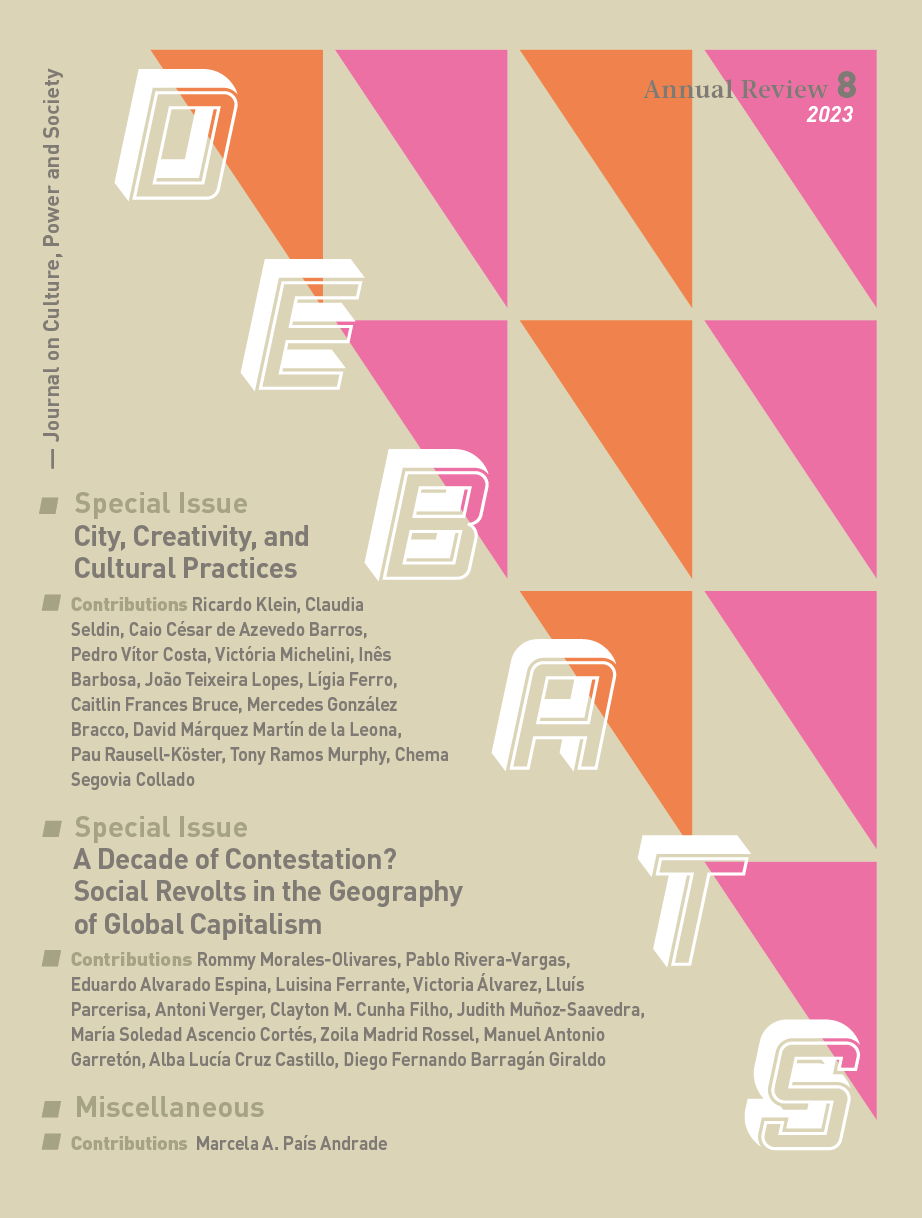Social Revolt in Chile: A political counter-hegemony challenging the Neo-Liberal narrative?
Palabras clave:
neoliberalismo; democracia; movimientos sociales; contrahegemonía; cambio culturalResumen
On the 18th of October 2019, Chile began undergoing the biggest political and social upheaval since
the one that ended the Pinochet dictatorship. This upheaval slowly gave way to a process of
impeachment of the traditional institutions of The State. This paper looks at the political
dimension of the ensuing social revolt and its scope in the Constituent itinerary agreed on the
15th of November 2019. It seeks to answer the question of whether the mass movement was the
expression of a political counter-hegemony challenging the Neo-Liberal order. To this end, it draws
on the main theoretical currents questioning the fit between democracy and Neo-Liberalism,
especially Chantal Mouffe's ‘antagonistic’ notion of ‘the populist moment’. In practical terms, it
analyses, on the basis of past political and electoral behaviour, two cleavages that tie in with
the emergence of the populist moment, that of elite/people and parties/ independents. From the
analysis of the electoral data covering the last thirty years and that bearing on the results of
the 2021 election of the members of the Constituent Convention, it is concluded that political
weariness is mirrored in the two cleavages defining the populist moment. Moreover, there was a
strengthening of the various political forces that saw themselves as anti-Neo-Liberal.
Descargas
Citas
Alvarado Espina, E. (2017). La calidad de la democracia en España y Chile. Un estudio a partir de la desigualdad social y el elitismo político. PhD thesis. Madrid: Universidad Complutense de Madrid.
Alvarado Espina, E. (2018). Una aproximación crítico-contextual al declive de la democracia en la era neoliberal.
Revista Española de Ciencia Política, 47, 69-91.
Alvarado Espina, E., Morales Olivares, R. and Rivera Vargas, R. (2019). Radicalizar la democracia desde los movimientos sociales. Los casos comparados de Podemos en España y del Frente Amplio en Chile. Revista Izquierdas, 48, 87-105.
Bauman, Z. (2014). ¿La riqueza de unos pocos nos beneficia a todos? Barcelona: Paidós.
Boas, T. C., &Gans-Morse, J. (2009). Neoliberalism: From new liberal philosophy to anti-liberal slogan. Studies in comparative international development, 44(2), 137-161. https://doi.org/10.1007/s12116-009-9040-5
Dahl, R. (1997). Poliarquía. Participación y Oposición. Madrid: Alianza. Dahl, R. (2012). La democracia. Barcelona: Ariel.
Deutsch, K. (1966). The Nerves of Government: Models of Political Communication and Control. New York: Free Press. Encuesta Ciudadana (2019). Primer boletín de resultados (online). https://www.achap.cl/wp-content/uploads/2019/11/Primeros-Resultados_Encuesta-Ciudadana25.10-1.pdf.
Foucault, M. (2012). El poder, una bestia magnífica. Buenos Aires: Siglo veintiuno.
Garretón, M. A. (2021). Del “Estallido” al Proceso Refundacional. El Nuevo Escenario de la Sociedad Chilena. Asian Journal of Latin American Studies, 34(2), 39-62.
Garretón, M. A. (2012). Las relaciones entre política y sociedad: Hacia una refundación. Mensaje, 61(611), 6-10. Garrido-Vergara, L. (2020). Political, Social, and Cultural Capital in the Chilean Political Elite, 1990–2010. Latin American Politics and Society, 62(1), 121-141.
Harvey, D. (2007). Breve historia del neoliberalismo. Ediciones Akal.
Hayek, F. (1993). La desnacionalización del dinero. Madrid: Unión Editorial. Hermet, G. (2008). El invierno de la democracia. Barcelona: Los libros del Lince
Huneeus, C., Lagos, M. and Díaz A. (2015). Los dos Chiles. Santiago de Chile: Catalonia.
Jörke, D. (2008). Post-democracia en Europa y América Latina. Revista de Sociología, (22). 141-156. https://doi. org/10.5354/0719-529X.2008.14488
Keane, J. (1992). Democracia y sociedad civil. Alianza Editorial.
Leiva, B. A. (2020). Estallido social en Chile: la persistencia de la Constitución neoliberal como problema. DPCE Online, 42(1), 2037-6677.
Madariaga, A. (2020). Neoliberal Resilience: Lessons in Democracy and Development from Latin America and Eastern Europe. Princeton: Princeton University Press.
Mayol, A. (2019). Big bang. Estallido social 2019: Modelo derrumbado-sociedad rota-política inútil. Editorial Catalonia. MORI (2020). Barómetro del trabajo enero (online). https://cut.cl/cutchile/2020/01/24/barometro-del-trabajo-mori-fiel-enero-2020-percepciones-y-expectativas-de-la-coyuntura-social-politica-economica-del-pais/
Mouffe, C. (1999). Deliberative democracy or agonistic pluralism? Social Research, 66(3), 745-758.
Mouffe, Ch. (2012). La paradoja democrática. El peligro del consenso en la política contemporánea.
Barcelona: Gedisa. Mouffe, Ch. (16th June 2016). El momento populista. See: https://elpais.com/elpais/2016/06/06/opinion/1465228236_594864.html.
Mouffe, Ch. (2018). Por un populismo de izquierda. Buenos Aires: Siglo Veintiuno Editores.
Nun, J. (2003). Democracy: Government of the People or Government of the Politicians? Rowman & Littlefield.
Offe, C. (2014). The Europolis experiment and its lessons for deliberation on Europe. European Union Politics, 15(3), 430-441. https://doi.org/10.1177/1465116514532557
Schmitter, P. C. (2015). Crisis and transition, but not decline. Journal of Democracy, 26(1), 32-44. doi:10.1353/ jod.2015.0004.
Stiglitz, J. E. (2011). Rethinking macroeconomics: What failed, and how to repair it. Journal of the European Economic Association, 9(4), 591-645. https://doi.org/10.1111/j.1542-4774.2011.01030.x
Descargas
Publicado
Cómo citar
Número
Sección
Licencia
Sin perjuicio de lo dispuesto en el artículo 52 de la Ley 22/1987 de 11 de noviembre de Propiedad Intelectual, BOE del 17 de noviembre de 1987, y conforme al mismo, los autores o autoras ceden a título gratuito sus derechos de edición, publicación, distribución y venta sobre el artículo, para que sea publicado en Debats. Revista de cultura, poder y sociedad.
Debats. Revista de cultura, poder y sociedad se publica bajo el sistema de licencias Creative Commons según la modalidad «Reconocimiento - NoComercial (by-nc): Se permite la generación de obras derivadas siempre que no se haga un uso comercial. Tampoco se puede utilizar la obra original con finalidades comerciales».
Así, cuando el autor o autora envía su colaboración, acepta explícitamente esta cesión de derechos de edición y de publicación. Igualmente autoriza a Debats. Revista de cultura, poder y sociedad, la inclusión de su trabajo en un fascículo de la revista para que se pueda distribuir y vender.











